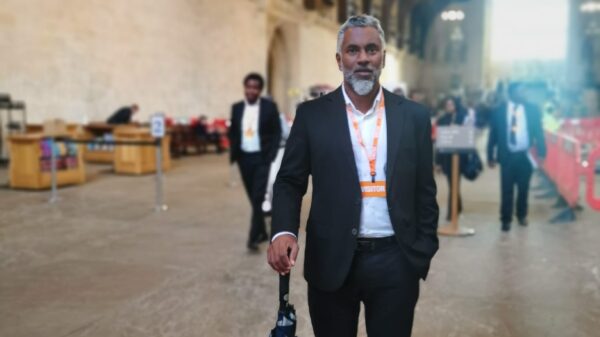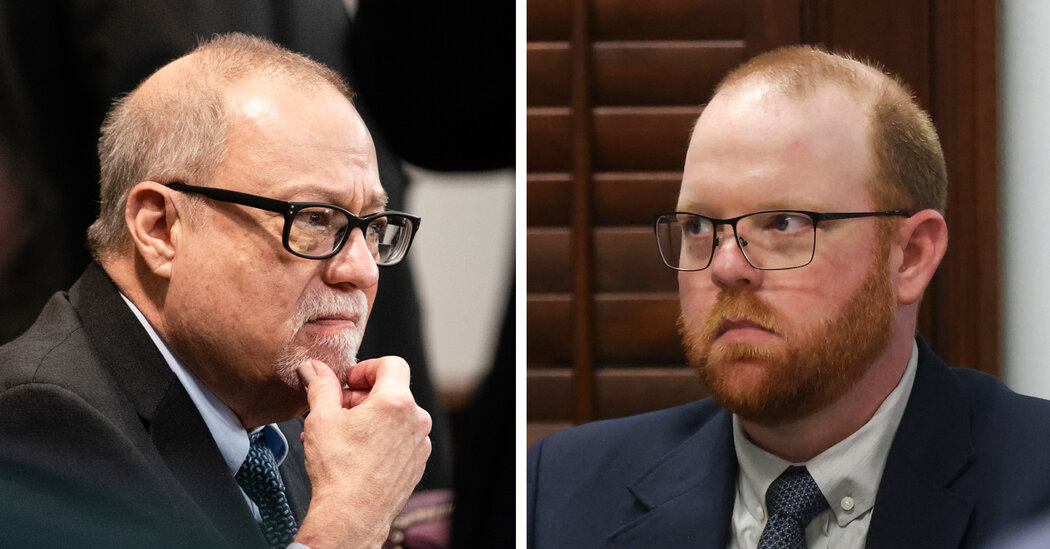Gregory and Travis McMichael had previously agreed to plead guilty, but a federal judge rejected the deal, which offered 30-year sentences. Jury selection is set to begin on Monday.
ATLANTA — Travis and Gregory McMichael, two of the three men convicted in state court of murdering Ahmaud Arbery, have withdrawn guilty pleas in their federal hate-crimes case, clearing the way for a trial that will once again revisit the afternoon two years ago when they chased Mr. Arbery, a Black man, through their South Georgia neighborhood, a chase that ended with three shotgun blasts, and Mr. Arbery dead on the pavement.
And even though the McMichaels and a third man were sentenced to life in prison after a high-profile murder trial attended by national civil rights icons like the Rev. Jesse Jackson, the second trial could prove just as dramatic as the first.
It is also likely to be even uglier.
The McMichaels had previously agreed to plead guilty to hate-crime charges in exchange for 30-year sentences in federal prison. But this week, Judge Lisa Godbey Wood rejected the deal the government had reached with Travis McMichael, 36, essentially nullifying an identical deal reached with his father, Gregory McMichael, 66, as well.
The judge’s decision came after Mr. Arbery’s family members passionately criticized the deals in court.
On Thursday night, Gregory McMichael’s lawyer, A.J. Balbo, and the Justice Department filed notice with the court stating that his plea agreement had been withdrawn, and announced that the two sides were ready to go to trial.
In a courtroom on Friday morning, Travis McMichael indicated that he, too, wished to go to trial, telling the judge he wanted to withdraw his earlier decision to plead guilty.
Unlike the murder trial, in which prosecutors focused on what they described as the rash and dangerous decisions Mr. Arbery’s pursuers made on the day of his killing, the federal government plans to put their alleged racist motivations front and center. The McMichaels and their neighbor, William Bryan, 52, each face a count of “interference with rights,” which alleges that they pursued and harmed Mr. Arbery “because of Arbery’s race and color.”
To bolster this argument, prosecutors are expected to introduce explicit evidence that the three men used racist language and harbored racist ideas that many, if not most, Americans will find repugnant.
“It’s going to be ugly,” said Robert G. Rubin, a Georgia lawyer who represented Travis McMichael in the murder trial. “There’s no doubt about it.”
Court documents and hearings over the past two years have hinted at some of the details that the federal jury may hear. An FBI agent this week said that Travis McMichael’s cellphone contained racist messages referring to Black people as “monkeys” and other slurs. A 2020 filing by state prosecutors describes an “Identity Dixie” Facebook post and a “Racial Johnny Rebel” post by Gregory McMichael. A federal filing in December by Mr. Bryan’s lawyer describes “racially insensitive language” Mr. Bryan used in text messages, as well as witness testimony “that would suggest Bryan did not approve of his daughter dating an African American man.”
Even before this evidence is introduced, issues of race, and questions about what constitutes a fair trial, could arise with jury selection, which is set to begin on Monday morning in U.S. District Court in Brunswick, Ga.
Such issues arose during jury selection in the state trial, a process that dragged on for two and a half weeks. In that case, potential jurors were drawn exclusively from Glynn County, Ga., where Mr. Arbery and the defendants lived. It was one of the biggest and most disturbing local news stories in decades, and the idea of finding jurors who had not heard about the case, or already formed opinions about it, was nearly impossible.
In the end, a jury was seated, but its composition of 11 white people and one Black person raised concerns that justice could be skewed in the defendants’ favor.
Understand the Killing of Ahmaud Arbery
The shooting. On Feb. 23, 2020, Ahmaud Arbery, a 25-year-old Black man, was shot and killed after being chased by three white men while jogging near his home on the outskirts of Brunswick, Ga. The slaying of Mr. Arbery was captured in a graphic video that was widely viewed by the public.
For the federal case, Judge Wood decided to broaden the pool of potential jurors, sending out summonses to roughly 1,000 residents spread over 43 of Georgia’s 159 counties.
At the same time, the rejected plea deals for the McMichaels may have introduced a new complication. Potential jurors may well have been exposed to news coverage of Monday’s hearing before Judge Wood, in which it became clear that the two men were ready to plead guilty to hate-crime charges.
That could make the selection of an impartial jury “more challenging,” said Page Pate, a legal analyst and veteran trial lawyer in Atlanta, though not impossible. “The standard is not whether they’ve heard about the case, or the attempted guilty plea,” Mr. Pate said, but whether the jurors “have made up their mind or are leaning strongly one way or the other.”
Legal experts say that to secure hate-crimes convictions, prosecutors may need to convince the jury not only that the men harbored racist views, but also that racism was a motivating factor when they went after Mr. Arbery.
Defense lawyers are likely to bring up much of the detailed information about Mr. Arbery’s previous visits to the neighborhood before the day he was killed, information that was painstakingly emphasized in the murder trial. In this case, defense lawyers will try to use that information to convince the jurors that the men were not trying to detain a random Black person for questioning, but Mr. Arbery specifically.
In addition to the hate-crime charges, each man is also charged with one count of attempted kidnapping. The McMichaels are each charged with one count of having a firearm during a crime of violence.
One of the most explosive allegations since the killing came in a pretrial motion in the state case, in which the state’s lead investigator said that Mr. Bryan told authorities that he heard Travis McMichael use a racist slur shortly after he shot Mr. Arbery.
Mr. McMichael’s lawyers refute that allegation. It is unclear whether prosecutors will be able to present it to the jury, given the constitutional dilemma it presents: If Mr. Bryan exercises his Fifth Amendment right not to testify, that would in turn deprive Travis McMichael of his Sixth Amendment right to confront his accuser.


























